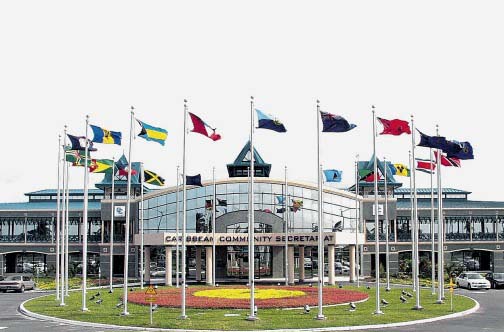
If the Caribbean Community Secretariat of Georgetown has not exactly been ‘shaking the headlines’ in terms of its role in the regional response to the COVID-19 pandemic, the Secretariat appears to be in the ‘thick of things’ in the terms of the coordination of the work of the Caribbean Community (CARICOM) insofar as the ongoing commitments relating to the recovery of the region from the impact of the virus on its respective economies are concerned.
Last week, news from the 13th Special Emergency Meeting of the Heads of Government Conference surfaced, virtually in the form of an update on what is known as the Caribbean Economic Recovery and Transformation Plan (CERT), a strategy put forward by a team regional experts under the leadership of Barbados Prime Minister Mia Mottley, who are among the most seasoned politicians in the region. A statement last week on the work involved in the effective implementation of the plan issued by the Secretariat said that work had begun towards the hopeful implementation of the plan and that the region was looking forward to its successful completion.
The meeting, the statement said, was chaired by the current Chair of the CARICOM conference, and served Trinidad & Tobago Prime Minister Dr Keith Rowley, while he also reported on a statement issued during the talks expressing their support to Guyana in the country’s border dispute with neighboring Venezuela.
In the meantime, against a background of evidence across the region that there has been no meaningful conflict in the spread of the pandemic and that the region may even now be threatened by a serious mutation of the virus, the regional forum also issued a statement calling for and a global summit to address equitable access and distribution of vaccines to combat the pandemic.
Meanwhile, the meeting was recorded as denying Washington’s unilateral declaration of Cuba as a “state patron of terrorism,” which came just days before the end of President Donald Trump’s turbulent term as President of the United States.
Putting the regional economic jigsaw puzzle back together again is almost certainly challenging for the Community given, first, its lack of material resources to meet some of the challenges, and second, the varying degrees of crisis facing member states. Given the continued efforts of the economically weak and small member states to isolate the physical effects of the pandemic, not least the pressure being placed on their physical resources, there is also, in the case of most member states , the deep gouges left in their economies by the ‘freight train’ collision effect that reducing global air travel has had on their tourism-driven and now emerging economies worsening in the face of new travel and quarantine. rules that will affect travel between Caribbean territories that are heavily dependent on tourism from Canada, Europe and the United States.